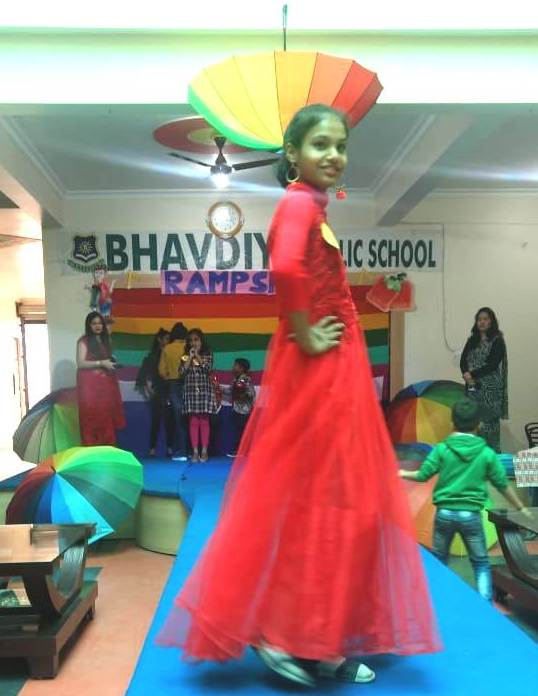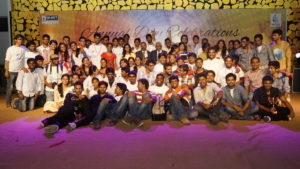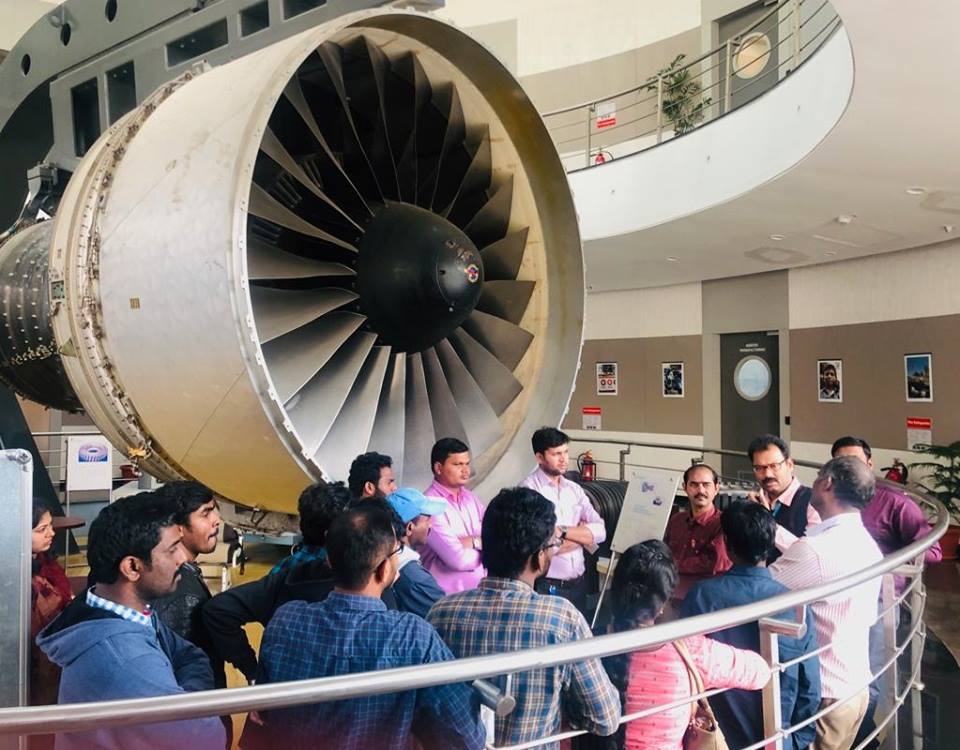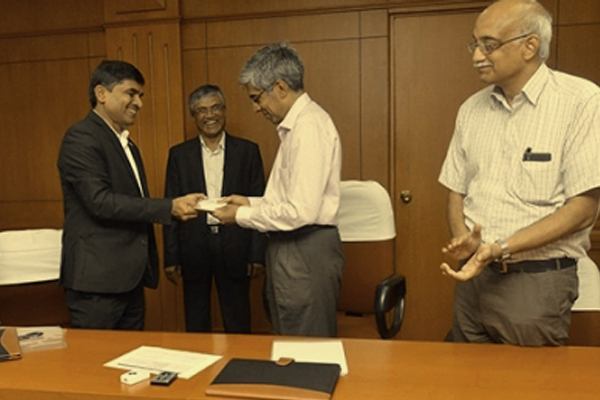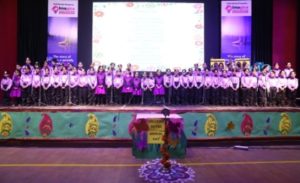 Global Indian International School (GIIS), Noida, celebrated its Annual Day for the academic year 2018-19. This occasion also marked its entry into 17th year of excellence in education. The event was graced by Dr Joseph Emmanuel, Director (Academics), CBSE Delhi, Manish Agarwal, Deputy Secretary RO Officer-CBSE Delhi and Regional Officer, Noida and Biswajit Saha, Director (Training & Skill Education), CBSE. The event was an interesting amalgamation of creativity, craft and brilliant performances. The theme of the event was “IMAGICA”, focusing on recreating the imaginary world of Disney characters. Students also paid tribute to international dance forms, where more than 1,000 students’ participated and over 700 parents witnessed the two-day function, along with the GIIS family.
Global Indian International School (GIIS), Noida, celebrated its Annual Day for the academic year 2018-19. This occasion also marked its entry into 17th year of excellence in education. The event was graced by Dr Joseph Emmanuel, Director (Academics), CBSE Delhi, Manish Agarwal, Deputy Secretary RO Officer-CBSE Delhi and Regional Officer, Noida and Biswajit Saha, Director (Training & Skill Education), CBSE. The event was an interesting amalgamation of creativity, craft and brilliant performances. The theme of the event was “IMAGICA”, focusing on recreating the imaginary world of Disney characters. Students also paid tribute to international dance forms, where more than 1,000 students’ participated and over 700 parents witnessed the two-day function, along with the GIIS family.
Annual day celebrations at GIIS, Noida on February 18
Kids Carnival at Bhavdiya Public School, Faizabad, on February 16
 Bhavdiya Public School has taken an initiative to explore the hidden talent of every kid. The Shining Stars shocased their talent with their other friends across the city. The school helps students grow independent and incorporate life-skills to foster their social development. For the recreation among kids, there were different stalls like face painting, birthday caps, fun with hand impression, tiara try, trampoline fun, finger puppets etc. The outstanding performance of tiny toddlers at Ramp and Baby show made the audience stuck to their chairs. An array of edible delights, exciting prizes ensured an unforgettable time for children with their near and dear ones.
Bhavdiya Public School has taken an initiative to explore the hidden talent of every kid. The Shining Stars shocased their talent with their other friends across the city. The school helps students grow independent and incorporate life-skills to foster their social development. For the recreation among kids, there were different stalls like face painting, birthday caps, fun with hand impression, tiara try, trampoline fun, finger puppets etc. The outstanding performance of tiny toddlers at Ramp and Baby show made the audience stuck to their chairs. An array of edible delights, exciting prizes ensured an unforgettable time for children with their near and dear ones.
Republic Day Celebrations at Harkishan Memorial Public School, Rohtak
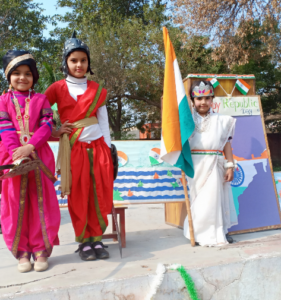 Republic Day celebrations at Harkishan Memorial Public School were based on the theme — Let Humanity Prevail Over Religion. Students from all classes showcased their patriotism through various performances and activities. Ritu Kaura, Principal, Harkishan Memorial Public School, and all the teachers conveyed the message of Integrity and motivated students to participate in various activities. The celebration clearly depicted the message, “All of us are the beloved children of Bharat Mata and that’s why we should not have disputes among us in the name of caste and religion.” The school tries to enable its students to analyse every situation and not to rely on rumors.
Republic Day celebrations at Harkishan Memorial Public School were based on the theme — Let Humanity Prevail Over Religion. Students from all classes showcased their patriotism through various performances and activities. Ritu Kaura, Principal, Harkishan Memorial Public School, and all the teachers conveyed the message of Integrity and motivated students to participate in various activities. The celebration clearly depicted the message, “All of us are the beloved children of Bharat Mata and that’s why we should not have disputes among us in the name of caste and religion.” The school tries to enable its students to analyse every situation and not to rely on rumors.
AICTE Paving the Way for Rural Youth to Compete Globally
The All India Council for Technical Education (AICTE) is a regulatory body for technical education. It is promoting development of technical education in a coordinated and integrated manner in the country, says Dr M P Poonia, Vice-Chairman, All India Council for Technical Education, in conversation with Chandan Anand of Elets News Network (ENN).
What was the drive for organising the recent AICTE-ECI-ISTE Chhatra Vishwakarma and AICTE-SAGY Initiative awards by the Council?
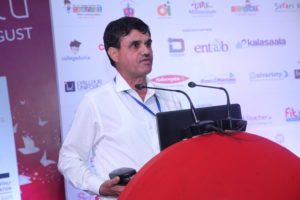
The awards were aimed at motivating youngsters, and inspiring leaders and institutions/organisations to raise their performance in their specific domains, leading to significant contribution towards development of rural areas in the country.
Our objective is to involve engineering graduates and leverage their technical know-how for betterment of villages. Our Hon’ble Prime Minister Narendra Modi has envisioned doubling the farmers’ income. AICTE is supporting his vision by using technical knowledge of engineers. It involves water and electricity conservation, low-cost housing, skilling rural youth, and sanitation related activities among others.
We are trying to connect all technical institutions across the country and their students in this activity. Most of the engineering graduates across the country are heading towards urban areas for employment. But, if an engineer works in a village by setting up a start-up or any other venture, it will help provide opportunities for employment of rural youth and doubling the village’s income.
Also Read: AICTE: Facilitating Technical Education to Promote Development
More than one million youths are graduating as engineers annually. If we can encourage even 1,000 or 2,000 students to work in villages, it will aid in improving condition of villages.
Meanwhile, around 120 teams competed under various categories of these awards. The winners were awarded by Hon’ble Vice President M Venkaiah Naidu at AICTE New Delhi.
Is AICTE also playing the role of incubation centre in the aforesaid context? How is the Council encouraging institutes to adopt villages and helping in their development?
Every year, Members of Parliament adopt 800 villages to develop them holistically. Technical institutions near such villages encourage the youths to send ideas to Innovation Cell of AICTE. After filtering the most beneficial ideas, the Council also incubates them. Not only this, AICTE is also spending a lot of money to support the rural youth in converting their ideas into products beneficial for villages.
Apart from its role as a regulatory body, how is AICTE encouraging skill development among youth in urban and rural areas?
In the curriculum prescribed by the AICTE for first year to final year students in technical institutions, the focus is more on skilling or hands on experience. Theoretical component of the curriculum has been reduced now and the practical/laboratory part or connecting them with the industry has already begun.
So, our focus for institutions, located in urban area or rural area, is on providing industry exposure to their students and also connecting them with the society. If students are able to solve the problems of society, their acceptability in the society will enhance and undoubtedly boost their confidence.
AICTE has also started a 14-point programme for connecting students with societal problems to provide solutions.
What is the vision and mission of AICTE for improving higher education scenario in the country?
India is world’s largest nation in terms of youth population. Our aim is to convert this population into an employable human resource which is not only useful for our country but also competes at the global level. We want these graduates to be in great demand in every nook and corner of the globe. These youths will definitely contribute in nation’s development once they are successful in life.
How is AICTE planning to boost the industry collaboration to bridge industry-academia gap?
 In our approval process to set up a technical institute, we have made it mandatory that every institute has to sign MoUs with the industries near to them. Institutes should plan their teaching-learning processes as per the industry problems. Even students’ thesis and end semester projects should be in line with industry demands. We have implemented such a hand-holding mechanism across the country. We have also signed a good number of MoUs with different industries/ organisations in this regard.
In our approval process to set up a technical institute, we have made it mandatory that every institute has to sign MoUs with the industries near to them. Institutes should plan their teaching-learning processes as per the industry problems. Even students’ thesis and end semester projects should be in line with industry demands. We have implemented such a hand-holding mechanism across the country. We have also signed a good number of MoUs with different industries/ organisations in this regard.
What is your message for students and institutions?
Hard work, sincerity and dedication are the keys to achieve success in life. Students have to work honestly for achieving their goals. Students should never feel any kind of pressure. Rather than focusing on placements, students foremost focus be on acquiring more knowledge. Institutes must value the time and money which the students spend. Institutions must help their students in enhancing their confidence level. It is the institutes’ responsibility to nurture its students so that no one in the outside world can raise questions about the capabilities of its students.
VIBGYOR Group of Schools Building Leaders of Tomorrow
VIBGYOR Group of Schools offers a unique range of world-class educational services for the holistic development of students through curricular and co-curricular studies, says Ashish Tibdewal, CEO, VIBGYOR Group of Schools, sharing more insights in conversation with Elets News Network (ENN).
What factors make a school place itself among the top schools in a city or State?

In the current education scenario and environment, parents are looking out for schools that can provide their children education of the best quality, ensuring a secure future for them. there are many schools that have adopted different methodologies in terms of teaching and providing the necessary skills and learning environment to their students. to become the most sought-after school in any state or city, one needs to be unique and different from competitors.
We, at VIBGYOR, provide holistic education system that nurtures students with talents and skills aimed to nurture leaders of tomorrow. we have been able to achieve this goal with the help of our specialised, scripted, interdisciplinary curriculum that is developed in-house by a team of academicians with expertise in school education and child development. his is further complemented with the help of our highly skilled educators who are enthusiastic and passionate to put in their energy towards every student’s growth.
Also Read: VIBGYOR Schools: Redefining Teaching Learning Methodologies
How does VIBGYOR develop a curriculum that is interesting as well as focussed on the holistic development of children at your school?
Our mission is to provide the highest quality of education in a safe, secure, and nurturing environment. it helps our students develop as progressive thinkers equipped with skills necessary for facing the challenges of a rapidly changing world. the curriculum followed at our primary and high school level is delivered through research-oriented, activity-based and interdisciplinary learning modules, which aids in students’ deeper understanding of subjects. these modules are further integrated with several experiential learning activities such as educational trips, industrial exposure, domestic and international tours at regular intervals. the curriculum is also constantly revised to integrate latest teaching and learning methods in the education sector.
 With the ever-changing dynamics of the education sector, how do you think the teachers are changing their way of imparting knowledge?
With the ever-changing dynamics of the education sector, how do you think the teachers are changing their way of imparting knowledge?
Today, relying on textbooks or teaching in a classroom would be insufficient considering the changes that are taking place on a daily basis. thus, in our school, we ensure that the teachers and students get the best facilities and amenities to help in their education. we also encourage participation in various programmes and extra- curricular activities that help students to have fun and enjoy their time in school. we have specialised teacher training Programmes designed to further enhance the teaching skills and make teachers follow breakthroughs in the field of education. with the ideal teacher-student ratio of 1:10, each child is able to get individual attention of teachers which leads to a healthy and effective interaction between them.
How does the school meet expectations of parents and requisite government standards simultaneously?
We cater and conform to requirements of national and international educational standards. VIBGYOR facilitates Primary, secondary and Higher secondary education under reputed national and international boards like Central Board of secondary education (CBse), Council for the indian school Certificate examinations (CisCe) and university of Cambridge assessment international education (Caie). But at the same time, we also ensure that our curriculum and holistic education system integrates the best teaching methods from around the world.
Also Read: VIBGYOR: A Launch Pad for Your Child’s Imagination
As parents want their children to get the best quality education, we have designed our system to foster the holistic development of every student. all the learning interventions in and outside the classrooms serve to meet the specific learning styles, motivators and need of the individual student.
What are VIBGYOR’s future plans and how does it plan to leverage its education system across the country?
We have launched new schools in Bengaluru, Pune and our first school in mangalore recently. we are planning to further expand our reach by opening new schools in various other cities across india. with the help of dedicated educators trained to channelise their energy and resources towards child-centred qualitative learning, we will be able to provide the best quality education to children and help build the leaders of tomorrow.
Sreenidhi Institute of Science and Technology Preparing Socially Sensitive Engineers
Sreenidhi Institute of Science and Technology (SNIST) was established in 1997. It was among the first institutes accredited by Jawaharlal nehru technical University (JNTU) Hyderabad and approved by Government of Andhra Pradesh (AP). In a short span of five years and six months, SNIST was accredited by national Board of Accreditation (NBA). The institute also recognised as a research centre by the Department of Scientific and Industrial Research (DSiR), Government of India. SNIST is the only institute in Telangana and Andhra Pradesh as a recipient of World Bank Assistance under TEQIP in Phase-I & II.
Mission:
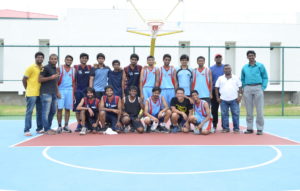 SNIST is committed to provide world-class Education, Research, Training and Consultancy Programmes in the chosen fields/ technical disciplines with emphasis on culture and to respond to the changing global competitive environment. the institute emerged as a centre for learning through rigorous and exciting research environment for expanding knowledge in chosen fields.
SNIST is committed to provide world-class Education, Research, Training and Consultancy Programmes in the chosen fields/ technical disciplines with emphasis on culture and to respond to the changing global competitive environment. the institute emerged as a centre for learning through rigorous and exciting research environment for expanding knowledge in chosen fields.
The institute also serves the industry, other institutions and the Society through highest professional values and ethics. SniSt also offers assistance to nearby villages as a responsibility towards the society, and to train unemployed youth in technical trades for enabling them to get employment.
Vision: SNIST envisioned to emerge as a leading World-class institution in higher education landscape by way of realising excellence in the chosen fields of technical disciplines through teaching, research and consultancy.
Programmes and Activities: SNIST offers seven undergraduate (UG) and seven postgraduate (PG) programmes in engineering along with an MBA course. Some of important details about institute’s various courses are as follows:
- Present Annual intake is 1620 at UG level and 228 at PG level
- Lateral Entry Facility for Diploma Holders
- Ph D Programmes on part-time basis
- R&D and Consultancy Professional Services
- Services to Community
With the world class faculty members, SNIST nurtures its students holistically with the best teaching-learning processes followed across the globe. the institute has also set up a Technology Development Test Center and signed MoUs with renowned global universities. Some of the major achievements of SNIST include:
- Collaboration with VCAt, new York, USA. Study in india, Get a US Degree in Aviation
- Indo-US Collaboration for Engg Education programmes
- Intelligent infrastructure and Learning Resources
- Glittering Results of final year students
- UGC/JntUH conferred Autonomous Status to the institution in the year 2010-11
Awards & Distinctions
- Best Engineering College in A P Award in 2008 by ISTE A P Section
- National Award for the best Human Resource Development practices from Indian Society for Training and Development. it is the first of its kind to an educational institution in the Country
- SNIST was ranked 30th by Outlook among 1,500 self financing engineering colleges in India in 2007 and received same rating in 2008 as well
- The institute was ranked second in the State for two consecutive years in 2008 and 2009 by Competition Success Review
Placement Record:
Strong academics, updated Campus Recruitment training Program and constant personal interaction with leading organizations helped us achieve unprecedented Placements for 2007-11 batch of students by leading Companies. 96 percent of all eligible students were placed in the first round of placements. Accenture, Deloitte, Cognizant, infosys, Wipro, Mahendra Satyam, intergraph, Patni Computers, CapGemini are some of the companies that visited our campus for recruitment.
Recently, the institute has recorded 84 percent of placements. List of eminent companies visited the institute includes VSSC of indian Space Research Organisation; Singareni Collieries Limited, Hyderabad; R&D Center, Institute of Indian Foundrymen; VIMTA Labs Limited, Hyderabad; ASL and RCI of DRDO; Bore-well Equipment Corporation; Nuclear Fuel Complex, Hyderabad; Satyam Computer Services Ltd; and Nucleonix, Cherlapalli, Hyderabad, among others.
Establishment of Civil Services Aspirants Club:
The inspiration from Mahesh Bhagwath Garu, Commissioner of Rachakonda, was the key reason behind setting up Civil Services Aspirtants Club by the college. it encourages our students to prepare for Civil Services while pursuing various engineering courses. this club was formed two years back and about 300 students are members of this club and college has given the facility to organise seminars on their own and also inviting distinguished officials to address the members. the college has also purchased a number of books and also subscribed to the software which is helping the students in their preparations.
TASK Enhancing Skilling Synergy Among Government, Industry and Academia
Telangana Academy for Skill & Knowledge was established by the Government of Telangana to enhance skilling synergies between Government, Academia and Industry to enhance employability quotient of youth in the state.
SUCCESSFUL INITIATIVES
Technology/Domain Skilling in collaboration with Industry
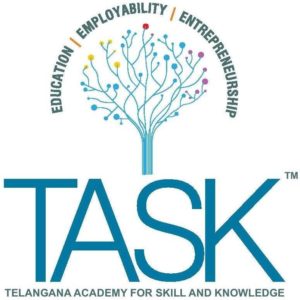 TASK enables short term Technology Skilling and certification in collaboration with technology organizations like Salesforce, AWS, ServiceNow, Google, Oracle, Samsung, CISCO, TataStrive, NSIC, ICICI Bank etc. on latest technologies. These skilling sessions, delivered in colleges provide students with hands on experience on the technology and also help them gain confidence in facing interviews.
TASK enables short term Technology Skilling and certification in collaboration with technology organizations like Salesforce, AWS, ServiceNow, Google, Oracle, Samsung, CISCO, TataStrive, NSIC, ICICI Bank etc. on latest technologies. These skilling sessions, delivered in colleges provide students with hands on experience on the technology and also help them gain confidence in facing interviews.
TECHNOLOGY ENTREPRENEURSHIP PROGRAMME (TEP)
Technology Entrepreneurship Programme (TEP) is a semi virtual programme offered by the Indian School of Business (ISB) in partnership with Telangana Academy for Skill and Knowledge (TASK). The program is tailored specifically to motivate and generate interest in entrepreneurship among engineering students. TEP has three primary goals at its core:
- To promote technology entrepreneurship as a viable career option and nurture the culture of entrepreneurship in the region
- Link entrepreneurial and innovative behaviour to educational and career pathways
- To provide an environment/experience for engineering students to create investable technology based start-ups
The components of TEP can be broadly categorized into three areas:
- Core Courses: Online modules that cover topics on Product and Service Design, Innovation Management and Entrepreneurship.
- Practicum: Hands on activity based learning through Human Centric Design Thinking Workshop, Engineering Design Challenge, Mentor Workshops/Boot-Camps and Industry Visits.
- Build Your Own Venture: A series of boot-camps and mentor clinics are conducted to assist students to build their own venture. Additionally, classroom sessions on topics like marketing strategy, negotiations and other management related topics, are held to prepare students be pitch ready for Demo Day with prospective investors.
FINISHING SCHOOL
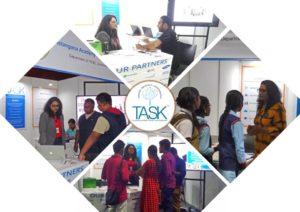 With a view to meet the shortage of skilled human resource requirements of corporates, TASK has taken up an initiative to skill unemployed youth based on industry requirements. The finishing school program is designed for a period of 8/12 weeks and his effort has twin objectives of:
With a view to meet the shortage of skilled human resource requirements of corporates, TASK has taken up an initiative to skill unemployed youth based on industry requirements. The finishing school program is designed for a period of 8/12 weeks and his effort has twin objectives of:
- Helping young graduates to find jobs by enhancing their employability quotient
- Offering skilled candidates to Corporates
The programme offers rich inputs to enhance and sharpen the required skills among the graduates and make them employable. This programme does not guarantee employment but helps in enhancing the strike rate of the candidate to get through a job interview and selection process. A 60 percent placement rate has been achieved since inception. The program is highly subsidized.
PROFESSOR OF PRACTICE (POP)
Professor of Practice is a distinguished professional from Industry (Eg: IT / ITES, Banking, Financial Services, Insurance, Retail, Healthcare, Automobile, Aviation, Pharmacy, Government services) either practicing or retired.
Professors of Practice help to deliver training to undergraduate students to improve soft skills that would impact the student’s personal and organizational skills.
Training students through the new skilling process designed by TASK is a critical component for the students’ success and therefore the role that POPs (Professors of Practice) play in this process is of utmost importance.
Effective pedagogy incorporates an array of teaching strategies that promote the wellbeing of students, improves students’ confidence and thus enables the students to perform better in interviews.
DELIVERY METHODOLOGY:
The purpose of introducing a change in the pedagogy is that they provide a guide for developing productive practice. The pedagogy includes 25% concept, 25% case study, 25% practice session, and 25% evaluation & feedback of the student.
The programme helps students improve their communication and teamwork, as well as problem- solving and decision making abilities.
Modules:
Personal Skills: Communication Skills, Presentation Skills, Time Management, and Values (SrEE) (Safety, respect, Environment, Ethics)
Organizational Skills: Group Discussions, Preparing for Interviews, Goal Setting, Team Work, Problem Solving, and Decision making.
Finance Commission discusses key education issues with MHRD
The Fifteenth Finance Commission in a meeting with the Department of School Education and Literacy, Ministry of Human Resource Development (MHRD), has discussed key issues of the sector requiring the Commission’s intervention in New Delhi on Thursday.
The Key issues discussed during the meeting include: Investment in school infrastructure, teacher’s salaries & training, career counselling, school students, Pre-schooling of children akin to the Sikkim model to give a boost to early learning, among others.
The meeting was chaired by the Union Minister for Human Resource Development Prakash Javadekar along with the Chairman of the Finance Commission N K Singh. Members of the Commission and Senior Officers of the Commission as well as MHRD attended the meeting.
During the meeting steps to attract greater to private capital and private Partnership into the school education sector were disucussed. The officials also talked about integrating B Ed courses into two year integrated BA – B ED course/B Com – B ED courses in the future to streamline the availability of trained teachers.
The Commission also expressed concern over parents’ preference to send children to private English medium schools over the government schools. During the meeting, the Commission stressed on the requirement for evaluation of schools and dissemination of the results to help parents in making informed choices.
The HRD has asked for the support from 15th Finance Commission on the following issues:
- Incentive based grants to States based on Performance Grading Index (PGI).
- Requirement of Central funds amounting to a minimum of Rs.4,37,994.74 crore (to meet RTE Norms and other essential requirements) and Rs.5,66,087.74 crore to meet the SDG Goals by 2030.
- Ring fencing (of about 20%) of resources devolved to the States for School Education OR clear award for States and UTs for implementation of RTE Act, 2009 and other essential requirements (on the lines of 13th Finance Commission).
The Commission is scheduled to hold its second meeting with MHRD on 22nd February to deliberate on the issues of Higher Education.
IIT Madras, IIITDM Kancheepuram join hands on academics and research
Indian Institute of Technology (IIT) Madras and Indian Institute of Information Technology Design and Manufacturing (IIITDM) Kancheepuram have collaborated to boost research and academics.
As a major highlight of this collaboration, top 10 percent of of B Tech students from IIITDM Kancheepuram will be allowed to admissions for direct PhDs at IIT Madras after completion of Sixth Semester. Such students can pursue their studies of seventh and eight semesters at IIT Madras, revealed a statement from IIT Madras.
The two institutes of have signed an MoU on academic and research collaboration in presence of Prof Bhaskar Ramamurthi, Director, IIT Madras and Prof Banshidhar Majhi, Director, IIITDM – Kancheepuram.
Speaking about the importance of collaboration, Prof Ramamurthi said, “As the mentor Institution of IIITDM when the Institute was founded, IIT Madras has always been closely associated with IIITDM, Kanchipuram. There has been an active interaction between the faculty members of two institutions. This MOU now enables greater interaction between the students as well.”
Prof Majhi said, “The IIITDM students will have an opportunity to pursue their higher studies at IIT Madras and I am sure they will be motivated for an excellent career. In addition, the faculty of IIITDM will also have an opportunity to get research collaborations for sponsored projects and thesis supervision with the faculty of IIIT Madras. This MoU is expected to reinforce the collaboration and elevate IIITDM to the next level.”
IIITDM Kancheepuram is an Institute of National Importance for technical education and research established in 2007 by the Ministry of Human Resource Development, Government of India. The objective of the institute is to conduct design and manufacturing oriented engineering education and research along with promoting the competitive advantage of Indian products in global markets.
CBSE 12th Board Exam 2019 start from tomorrow: Do’s and Don’ts
To conduct board exams 2019 smoothly and prevent paper leak and other malpractices, the Central Board of Secondary Education (CBSE) has introduced a slew of measures including geo-tagged, time- based tracking and monitoring of confidential material and live web streaming from examination centres.
According to the datesheet released by the CBSE, class 10 board exams will begin from February 21 and class 12 board exams from February 15. The board has also issued important instructions for the candidates appearing in any of the exams.
In one of its first time initiatives, the board has launched a first-ever short movie on its website to help parents and teachers deal with stress. Students can connect with the counsellors and experts throughout the exam season over email, phone and video conferencing.
The CBSE has issued following guidelines for conducting the board exams smoothly:
Internal choice: This year, there will be 33 per cent more internal choices. CBSE said in its official release that it will also give special consideration to creative answers.
Reporting time: Candidates must report to exam centres before 10 am during exam days
Dress code: Students should wear their school uniforms during the exams. Candidates are strictly not be allowed to wear casual clothes.
Accompany: Parents/guardians or any person accompanying the candidate will not be allowed to enter the premises of the exam centre.
Admit card: It is must for candidates to bring admit cards for CBSE Board Exams 2019 without which they will not be allowed to appear for the exam.
Seat allotment: Candidates will be divided into a batch of 24 students in a class during the exam.
Old question paper banned: No one can carry question paper in the exam hall.
CBSE Board Exams 2019: Things allowed inside the examination centres
- Students are allowed to carry their pens and basic stationary inside the examination hall in a transparent pencil box or pouch not have anything written on it
- Diabetic students are allowed to carry a snack in clean wrap to the examination hall
- Only transparent water bottles will be allowed inside the examination hall
CBSE Board Exams 2019: Things NOT allowed inside the examination centres
- All sort of communication devices including mobile phones, pages, smart watches or health bands are prohibited. This also includes Bluetooth speakers, headphones, calculators, etc.
- Any sort of printed or written material is not allowed inside the examination hall
- Packed food like chips, cold drinks or biscuits are not allowed inside the examination hall








